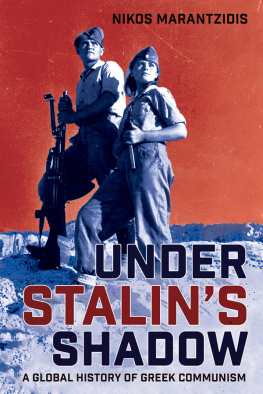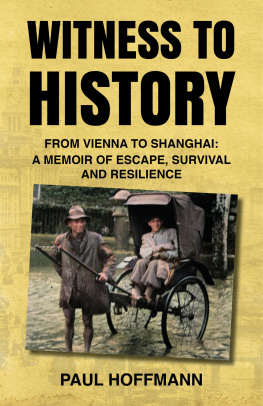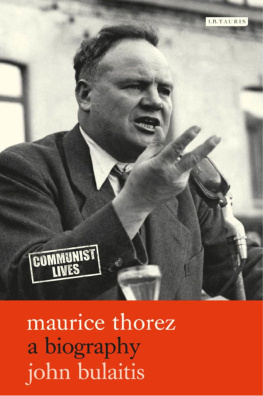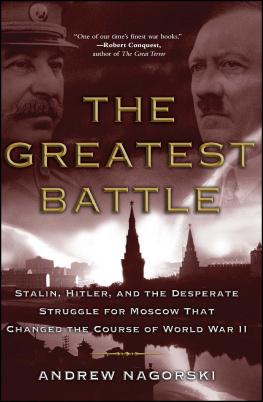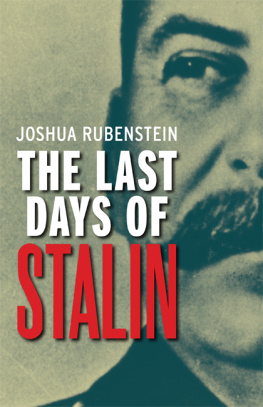This book is a publication of
INDIANA UNIVERSITY PRESS
Office of Scholarly Publishing
Herman B Wells Library 350
1320 East 10th Street
Bloomington, Indiana 47405 USA
iupress.indiana.edu
2016 by George Huppert
All rights reserved
No part of this book may be reproduced or utilized in any form or by any means, electronic or mechanical, including photocopying and recording, or by any information storage and retrieval system, without permission in writing from the publisher. The Association of American University Presses Resolution on Permissions constitutes the only exception to this prohibition.
The paper used in this publication meets the minimum requirements of the American National Standard for Information SciencesPermanence of Paper for Printed Library Materials, ANSI Z39.481992.
Manufactured in the United States of America
Library of Congress Cataloging-in-Publication Data
Names: Huppert, George, 1934 author
Title: Comrade Huppert : a poet in Stalins world / George Huppert.
Description: Bloomington : Indiana University Press, 2016. | Includes bibliographical references and index. Identifiers: LCCN 2015030953| ISBN 9780253019783 (cloth : alk. paper) | ISBN 9780253019844 (ebook)
Subjects: LCSH: Huppert, Hugo. | Authors, Austrian20th centuryBiography. | TranslatorsAustriaBiography.
Classification: LCC PT2617.U725 Z65 2016 | DDC 838/.91409dc23
LC record available at http://lccn.loc.gov/2015030953
1 2 3 4 5 21 20 19 18 17 16
INTRODUCTION
I NEVER KNEW HUGO HUPPERT. I WAS NOT AWARE OF HIS existence until years after his death. By chance, I found his three-volume autobiography on a shelf in the University of Cincinnati Library, which I happened to be visiting. Those books were rare items. Only one of his books was translated into English, and that was his Men of Siberia (1934). Originally published in Moscow that year, the book was made available to Communist sympathizers in New York and London, at a time when there was a good deal of sympathy for the Soviet Union in the West, just one year after Hitlers seizure of power and before the Moscow Trials revealed the brutal face of Stalins world.
I started reading the first of the three autobiographical volumes and I was completely taken with the authors account of his growing up in Bielitz, on the eve of the First World War. Bielitz was part of the Austrian Empire, a largely German-speaking city surrounded by Polish-speaking villages. I hardly knew anything about Bielitz, but I was born in the city of Teschen, only a few miles away, another German-speaking island in a sea of Polish and Czech villages.
My interest in the authors account of his familys experiences might not have carried me much further had I not noted that Hugo was born only a few months after my own fathers birth, in 1902. There were other similarities as well. Both boys left their hometowns to pursue advanced degrees, Hugo in political science, my father in chemistry. I was slightly intriguedwas the previously unknown Hugo Huppert a relative?and found to my surprise that I could not bring myself to put the memoir down: there was something familiar in Hugos voice, in his language, his storytelling. It was just a completely absorbing book.
My next step was to order the three volumes from an antiquarian book dealer in Berlin. He was able to add some other titles, several books of Hugos poetry, and his Italian travel book, Mnzen im Brunnen (Coins in the Fountain), among others. This hardly exhausted the huge bibliography of Hugo Hupperts works. There are other volumes of poetry, the adaptations of Mayakovskys poetry, and the adaptation of the Georgian national epic, Shota Rustavelis Vitiaz v tigrovoi shkure (The Knight in the Tiger Skin).
I started reading seriously now, especially the autobiographical books. Gradually I began to realize that it was not only the charm of Hugos writing that had me spellbound: it was also the story of his life, a life that was an almost perfect embodiment of a twentieth-century experienceif you happened to be born in Europe, especially in eastern and central Europe, between 1900 and the 1950s, when the killings of two world wars were extended by the mass murder of innocent civilians on the orders of two half-mad backcountry politicians, Djugashvili (Stalin) and Schicklgruber (Hitler).
At this point in my reading, in my discovery of Hugos writings, I decided to write a book about Hugos life. Not a biography, exactly, but the story of a poet whose life is perfectly representative of those men, women, and children who had the misfortune of coming into the world at the wrong time and in the wrong place. Especially if they were Jewish, they were not likely to survive the events set in motion in the 1920s.
Before the wars, before the collapse of empires, growing up in a town like Bielitz would have been something close to an idyllic experience. Still, even here, in this prosperous place full of industry and surrounded by lush forests and mountain ranges, it was not possible to avoid entirely the first stirrings of the madness to come. In the first two chapters of this book, I draw a contrast between the apparently idyllic life of the boy Hugo, growing up in Bielitz, and the violence in Vienna and in the provinces.
Right up to his departure for Vienna, in 1920, Hugo had been exactly what you would expect from a well brought up son of middle-class parents in a provincial city. He wrote poetry, he had a serious interest in music, and he loved his parents, his younger brother, his hometown, and, of course, girls. By the time Hugo reached Vienna, things had changed radically since the collapse of the empire, two years earlier. Austria was now a small republic. The political atmosphere in Vienna had shiftedfrom the right-wing antisemitic parties to the Social Democrats. The brand-new Austrian Communist Party was popular among Hugos friends and associates at the university, at least among the circle of mainly Jewish students who befriended him.


